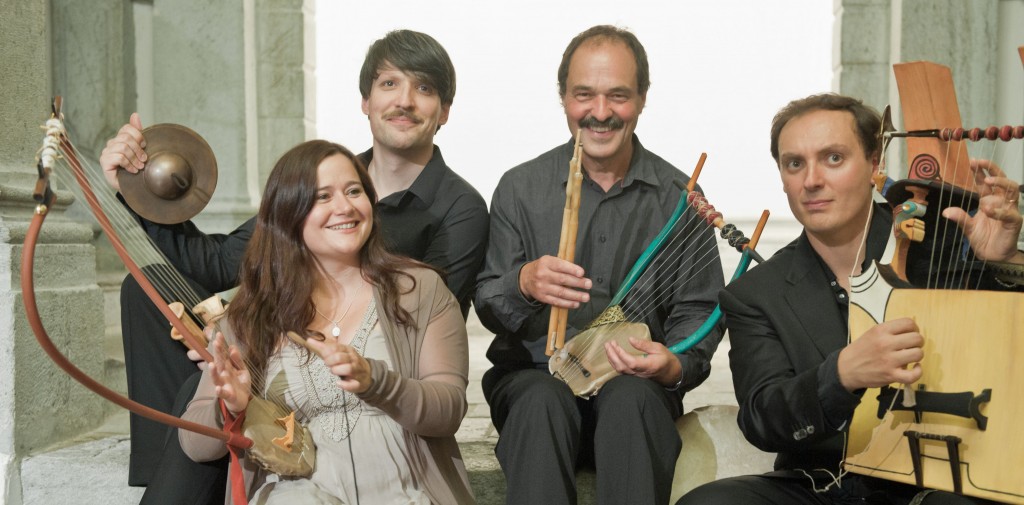lyric and epic
five different programmes
The programmes of the ensemble Melpomen are focused on different topics. Also the composition of the ensemble varies following the contents of the lyric chosen. The music of all programmes is recreated by Conrad Steinmann.

Programme Melpomen: Love and Wine
The texts of the two subjects of love and wine have been chosen to emulate those that may have been recited at a social gathering of free Athenian citizens, an Athenian symposium, from about 450 BC. The poems selected by the singers Sappho and Alcaeus from Lesbos and Anakreon and Bakchylides look into the elemental power of commencing love then turn to the enjoyment of wine. After this double celebration of life the following poems explore the dark side of love with all its disconcerting and destructive power. It is certainly not surprising that human feelings have hardly changed at all in 2500 years. Bewilderment of an-other sort is depicted, on the other hand, by Archilochos’ poem about the historically authenticated solar eclipse on 8th of April 648 BC. These monodies are surrounded and high-lightened by instrumental pieces that attempt to do justice to the variety of forms and instrumental timbres.
Programme Olympionikais: Victory and Disappointement
The programme ‘for the Olympic winners’, presents a musical victory festival for athletic heroes from the early 5th century BC, as it could have taken place at the court of Hieron II of Syracuse. It is based on lyrics by Pindar (520–438 BC) The protagonist is Hieron’s friend, the aristocratic poet and singer Pindaros, who accompanies himself on the kithara. Questioning and commenting a choir of high and low male voices support him – and surprisingly build a bridge to the present modern day Olympic games. Beside the concert version there is a also a scenic one of ‘Olympionikais’ which shows the original clothes of the musicians and masks of the choir but also includes the acrobats and jugglers as they are often depicted on vases from that period.
Programme Sappho: Pleasure and Displeasure
This programme follows the traces of the legendary singer Sappho of Lesbos but also draws a general picture of the mood of the 6th century BC in Ancient Greece. Personalities of vary ‘ego’ become obvious: Through Theognis staggering between ecstasy and desperation, or life weary Mimnermos, or statesmanlike Solon with his always up-to-date thoughts, as well as Anacreon with his joy of life and above all Sappho with her most intimate feelings. These shades are accompanied by the Aphrodite Hymns of the same period, lyrics in the style of Homer’s epic poems. A Mediterranean female voice, one male singer and plenty of meticulously reconstructed instruments of the period, add to the colours of Greek poetry the fascinating musical sounds.
Programme Choros: Dialogues and Antiphons
Solo and choral vocal music made their debut in the Greek-speaking world with the introduction of writing and the appearance of the singer Homer around 700 BC. Whereas in the case of Homer a unique singer sings and improvises long epics for entertainment, choral singing was at first a function of education, as we can observe in Sparta from Alcman’s poetry. Alternation between the main singer and the often reacting chorus becomes a further musical form, leading over time to the development of the Greek drama. With Sappho it is the girls entrusted to her who lament and chant their pleas for advice, in Pindar a flock of disciples reveres its idol. Alcman brings an actual duet, while in Sophocles’ Antigone the chorus becomes the protagonist.
Demeter: Drama in the Pantheon
The tale of the abduction of Demeter is a highly dramatic and at the same time also very poetic story that contains all the elements of a (human) drama, just like in later plays and even operas: a happy beginning, a conflict, terror, prolonged pain, compromise and reconciliation. In our version the actual narrator / main singer is joined by another singer, who embodies the female deities, and as a counterpart a singer for the male roles. In addition, a narrator in the respective local language accompanies the course of events.
